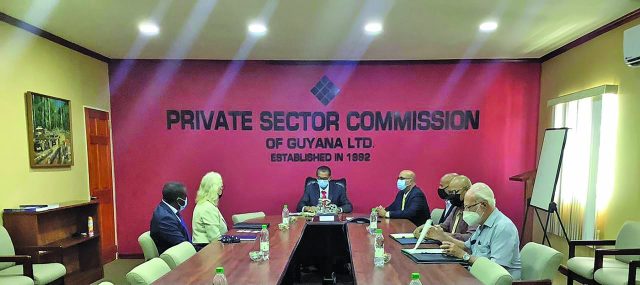The Private Sector Commission met with newly accredited British High Commissioner Jane Caroline Miller where they discussed, among other things, the need for electoral reforms in Guyana.

The PSC’s delegation was led by Chairman Paul Cheong.
On Monday, the PSC said that the cordial and fruitful discussion focused on several areas of mutual interest to the United Kingdom and Guyana, inclusive of matters pertaining to governance, electoral reform, local content, joint ventures, ease of doing business, enhancement of technical skills, and the overall enhancement of business activities.
Cheong, during the meeting, underlined the need for the establishment of a strategic productive relationship with the United Kingdom in an effort to strengthen bilateral relations with Guyana’s Private Sector.
The High Commissioner expressed her gratitude for the meeting and expressed hope for continuous engagements of this nature.
The meeting was also attended by representatives of the Georgetown Chamber of Commerce (GCCI), the Guyana Manufacturing and Services Association (GMSA), and other executives of the PSC.
The issue of electoral reform continues to dominate all discussions following the aftermath of the March 2, 2020 General and Regional Elections. The 5-month tumultuous impasse has brought to the fore the need for constitutional reforms as well as a complete reformation of Guyana’s electoral machinery.
There were concerted efforts by the former governing A Partnership for National Unity/Alliance For Change (APNU/AFC) and some GECOM officials to undermine democracy after the elections were held.
A number of ploys were involved, from GECOM officials inflating numbers to favour the former ruling party to supporters of the APNU/AFC using the courts to drag out the process after the elections were held.
However, a 33-day recount showed that the People’s Progressive Party/Civic (PPP/C) won the elections, but it took the firmness of local and regional courts; the resilience of GECOM Chair, Retired Justice Claudette Singh and threats of sanctions from the international community led by the United States before former President David Granger finally stepped aside and allowed President Ali to be sworn in.
Following the March 2020 elections fiasco, several observer missions made recommendations for reforms at the Guyana Elections Commission as well as to the entire electoral system.
Earlier in the year, the United States Department of State made the announcement that it will be supporting an 18-month project to strengthen the capacity of GECOM and the Attorney General’s Chambers to lay the groundwork as it relates to electoral reform.
The project, which will be implemented by the International Republican Institute (IRI), will also see efforts undertaken to encourage local civil society organisations (CSOs) to advocate for electoral reform in accordance with regional and international standards.
According to the US Embassy in Georgetown, through this project, GECOM, the AG Chambers, and civil society bodies will collaboratively consolidate and improve local electoral and constitutional law knowledge, establish an internal timeline to address electoral reform, improve collaboration for joint advocacy actions, and prioritise electoral and constitutional law issues while promoting reform through citizen engagement.
The project is part of ongoing support activities by the US Government to strengthen the capacity of Guyana’s governance for the benefit of all Guyanese.
This is especially significant given the critical role the US played in defending Guyana’s democracy last year. In fact, the US was the only country to impose visa restrictions against those persons who were responsible for or complicit in undermining Guyana’s democracy following the March 2 elections.
Since, then Guyana has been offered assistance, mostly technical, from several other bilateral partners – including Canada and India as well as various international organisations – to aid in the electoral reform process.
Thus far, several GECOM workers have been brought before the courts for the roles they played in attempting to sway the results of the March 2020 elections. The list includes Chief Elections Officer (CEO) Keith Lowenfield; Deputy CEO Roxanne Myers; Region Four Returning Officer Clairmont Mingo; and several ancillary staffers.
A national recount conducted showed that the PPP/C won the elections with 233,336 votes – some 15,416 more votes than the 217,920 votes that the APNU/AFC secured.
Discover more from Guyana Times
Subscribe to get the latest posts sent to your email.














